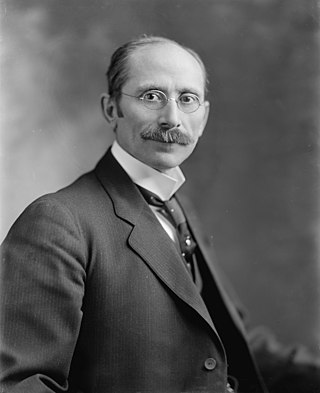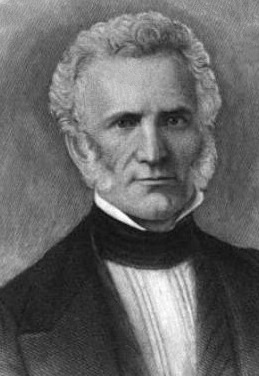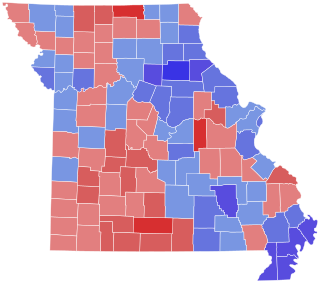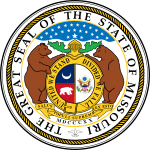
Forrest Carl Donnell was an American attorney and politician who served as a United States senator and the 40th governor of Missouri.

The 1926 United States Senate elections were elections for the United States Senate that occurred in the middle of Republican President Calvin Coolidge's second term. The 32 seats of Class 3 were contested in regular elections, and special elections were held to fill vacancies. The Republican majority was reduced by seven seats.
Spencer Darwin Pettis was a U.S. Representative from Missouri serving from 1828 until his assassination. He was also the fourth Missouri Secretary of State. Pettis is best known for being a participant in a fatal duel with Major Thomas Biddle. Pettis County, Missouri, is named in his honor.

Harry Bartow Hawes was an American lawyer, conservationist, and politician who served as a Democratic member of the U.S. House and Senate from Missouri. Hawes is best known for the Hare–Hawes–Cutting Act, the first U.S. law granting independence to the Philippines, and for earlier work assisting the Republic of Hawaii become a U.S. territory.

Joseph Little Bristow was a Republican politician from the American state of Kansas. Elected in 1908, Bristow served a single term in the United States Senate where he gained recognition for his support of several political causes of the Progressive era. In retirement, Bristow was a farmer in Annandale, Virginia.

George Howard Williams was an American politician and attorney from Missouri. A Republican, he served as U.S. Senator from Missouri from 1925 to 1926, completing the term of Selden P. Spencer following the latter's death.

Roscoe Conkling Patterson was an American lawyer from Missouri. He was most notable for his service as a United States representative (1921–1923) and a U.S. Senator (1929–1935).

John Joseph Cochran was a U.S. Representative from Missouri.

Joel Bennett Clark, better known as Bennett Champ Clark, was a Democratic United States senator from Missouri from 1933 until 1945, and was later a circuit judge of the District of Columbia Circuit. He was a leading isolationist in foreign policy. In domestic policy he was an anti-New Deal Conservative Democrat who helped organize the bipartisan Conservative coalition.

Charles Bingham Penrose was an American politician who served as a Democratic-Republican and Whig member of the Pennsylvania Senate for the 16th and 14th district from 1833 to 1841 and as a Republican member for the 1st district in 1857. He served as Speaker of the Pennsylvania Senate from 1838 to 1839 and again in 1841. He was a key figure during the Buckshot War unrest in Harrisburg, Pennsylvania, after the 1838 legislative election, when both Whigs and Democrats claimed control over the Pennsylvania House of Representatives.

The 1932 United States Senate election in Missouri took place on November 8, 1932, in Missouri. Incumbent Democratic Senator Harry B. Hawes did not seek re-election, and Democratic candidate Bennett Champ Clark was elected with 63.26% of the vote over former Mayor of St. Louis Henry Kiel. Clark slightly underperformed Franklin D. Roosevelt, who won 63.69% of the vote in the presidential election. He also notably carried the exact same counties Roosevelt carried in the Presidential Election

The 1938 United States Senate election in Missouri took place on November 8, 1938 in Missouri. The incumbent Democratic Senator, Bennett Champ Clark, was re-elected with 60.69% of the vote. He defeated Republican candidate and former Governor of Missouri Henry S. Caulfield.

The 1956 United States Senate election in Missouri took place on November 6, 1956 in Missouri. The incumbent Democratic Senator, Thomas C. Hennings Jr., was re-elected. He defeated Republican nominee Herbert Douglas, winning 56.4% of the vote. Hennings outperformed Democratic presidential nominee Adlai Stevenson II, who won 50.1% in the presidential election in Missouri.

The 1950 United States Senate election in Missouri took place on November 7, 1950 in Missouri. Incumbent Republican Senator Forrest C. Donnell ran for a second term in office but was defeated by Democratic nominee Thomas C. Hennings Jr.

The 1920 United States Senate special election in Missouri took place on November 5, 1918 in Missouri. Democrat William J. Stone was elected to the full term in 1914, but died on April 14, 1918. Xenophon P. Wilfley was appointed to the vacant seat on April 30, 1918. He lost the Democratic primary election to Joseph W. Folk, who was defeated by Republican Selden P. Spencer in the general election.

The 1920 United States Senate election in Missouri took place on November 2, 1920 in Missouri. The incumbent Republican Senator, Selden P. Spencer, was re-elected to a full term, having won a special election in 1918. He defeated Breckinridge Long of the Democratic Party. Spencer underperformed Republican presidential nominee Warren G. Harding, who won 54.6% of the vote in the concurrent presidential election.

The 1926 United States Senate special election in Missouri took place on November 2, 1926 in Missouri. The Republican Senator elected in 1920, Selden P. Spencer, died on May 16, 1925. George Howard Williams was appointed to continue Spencer's term on May 25, and ran in this special election to complete the term. He was defeated by the Democratic nominee Harry B. Hawes, who won 52% of the vote. Hawes also defeated Williams in the regular election held the same day.

The 1926 United States Senate election in Colorado took place on November 2, 1926. Incumbent Republican Senator Rice W. Means ran for re-election, but he was defeated in the Republican primary by Charles W. Waterman, a prominent attorney and party leader. In the general election, Waterman faced former Governor William Ellery Sweet, the Democratic nominee. Despite the nationwide Democratic trend, as well as the landslide victory for Democrats in the gubernatorial election, Waterman ended up defeating Sweet by a thin margin. Waterman would not end up serving a full term in the Senate, and died in office on August 27, 1932.

The 1944 United States Senate election in Missouri took place on November 7, 1944 in Missouri. Incumbent Democratic Senator Bennett Champ Clark was defeated in the primary by Roy McKittrick, who went on to lose the general election to Republican nominee Forrest C. Donnell. Donnell outperformed presidential candidate Thomas E. Dewey, who lost the state with 48.4% of the vote in the presidential election.

The 1962 United States Senate election in Missouri took place on November 6, 1962 in Missouri. The incumbent Democratic Senator, Edward V. Long, was elected to a full term, having won a special election in 1960 to finish Thomas C. Hennings' term. He defeated Republican nominee R. Crosby Kemper Jr, winning 54.4% of the vote.





















